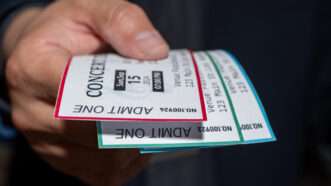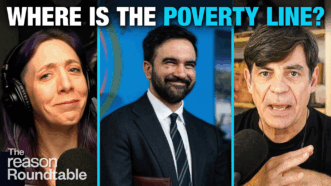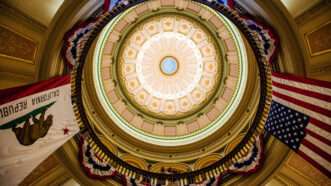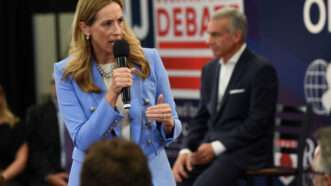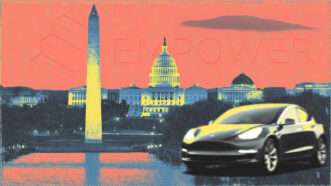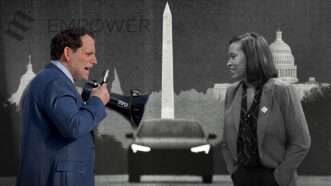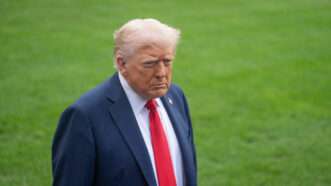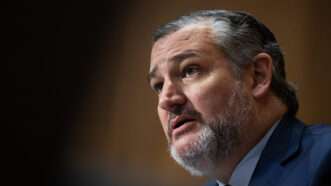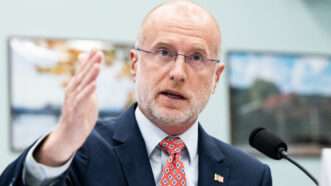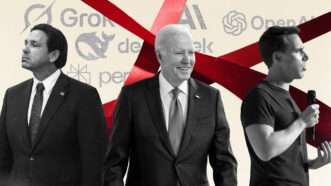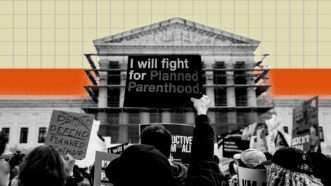Regulation
Is Economic Anxiety Driving People to Socialism?
Plus: War crime allegations against Hegseth, Congress threatens the legal hemp industry, and reflections on the legacy of Tom Stoppard
Lawmakers To Consider 19 Bills for Childproofing the Internet
KOSA is back, along with more than a dozen other bills that will erode free speech and privacy in the name of protecting kids.
Self-Driving Cars Will Make the World Safer for Cats—and Humans Too
The accidental death of one cat in San Francisco is triggering calls for banning Waymo. That would be a huge mistake.
Psychoactive Hemp Products Will Be Federally Prohibited in a Year Unless Congress Intervenes
A spending bill approved as part of the package that ended the federal shutdown aims to close a loophole that gave birth to $28 billion industry.
Meta's Victory Over the Federal Trade Commission Shows the Market Moves Faster Than Antitrust Enforcement
The decision ends the witch hunt begun under the first Trump administration.
A Reporter's Unwelcome Questions Provoke Yet Another Trump Threat To Yank Broadcast Licenses
The president thinks TV networks have a legal obligation to cover him the way he prefers. The FCC's chairman seems to agree.
Anthropic's CEO Says AI Needs More Regulation. Conveniently, It's the Kind Anthropic Can Afford.
Anthropic CEO Dario Amodei doubles down on AI doomerism during 60 Minutes interview with Anderson Cooper. Don't buy it.
AI Art in Call of Duty: Black Ops 7 Leads Rep. Ro Khanna To Call for More Regulation
The California congressman insists he's no Luddite, but his policy proposal suggests otherwise.
This Gun Case Harks Back to Constitutional Concerns About the Limits of Federal Power That Now Seem Quaint
Congress justified that National Firearms Act of 1934 as a revenue measure—a rationale undermined by the repeal of taxes on suppressors and short-barreled rifles.
Fast Food's Unexpected Bipartisan Break
A new bipartisan bill aims to protect franchisors from punishment for their franchisees’ actions, signaling rare unity on economic freedom.
The Perils of Viewing Psilocybin Strictly As a Psychiatric Medication
The most common uses of "magic mushrooms" will never gain FDA approval.
Trump Pardons Mountain Runner Michelino Sunseri, Who Was Prosecuted for Using an Unapproved Trail
The decision is consistent with the president's avowed concerns about "overcriminalization in federal regulations."
California's Aggressive Regulations Put Burgeoning AI Industry at Risk
Overly strict or poorly designed rules could slow beneficial uses of AI in healthcare, education, infrastructure, and public safety.
The CHAT Act Won't Protect Kids, But it Might Break the Internet.
By forcing government ID verification for AI tools, Congress risks censoring everyday digital services and driving young Americans to unsafe overseas platforms.
New Jersey Sticks With a Conventional Democrat
Mikie Sherrill will mostly continue business as usual—but with the possibility of some regulatory reform.
Why Are Lawmakers Crusading Against Surge Pricing in Restaurants?
Progressive politicians want to ban restaurants from adjusting prices based on demand—even when no one’s actually doing it.
Maybe AI Therapists Will Suck. That Doesn't Mean We Should Ban Them.
It is possible to be both skeptical of the supposed effectiveness of AI therapy and wary of sweeping state regulations.
The Clean Air Act Is Making Our Air Dirtier
Wildfire smoke is bad for your health. Environmental regulations make it worse.
Feds Pump the Brakes on Autonomous Trucks
An obscure federal rule is slowing the self-driving revolution.
Needlessly Strict Federal Rules on Radiation Exposure Are Stalling Nuclear Power Development
Living within a few miles of a nuclear power plant exposes someone to a small fraction of the radiation of an X-ray.
Empower Stays on D.C. Streets as Appeals Court Weighs Future of Rideshare Company
The D.C. Superior Court found Empower still in contempt of court despite updating its software-as-a-service agreement and will reconvene in January.
D.C. Will Arrest This CEO if His Rideshare Alternative Doesn't Shut Down by Friday
Empower CEO Joshua Sear is guilty of providing a cheap, popular alternative to Uber in the nation's capital.
Original Zyn: FDA Failures Allow Fake Nicotine Pouches To Flood U.S. Market
By refusing to approve safer nicotine pouches, regulators have turned gas stations into gray markets for knockoffs.
Oregon's E-Cigarette Censorship Is Unconstitutional—and Makes No Sense
Sometimes the state's rules require stores to cover almost the entire label of products—in places that don't even admit minors.
Whoops—Ohio Accidentally Excludes Most Major Porn Platforms From Anti-Porn Law
Ohio lawmakers set out to block minors from viewing online porn. They messed up.
Tennessee Alcohol Wholesalers Are Grabbing Control of the State's Hemp Market
A new law hands hemp distribution to the same powerful middlemen who dominate liquor sales and block out-of-state suppliers.
Josh Hawley and Democrat Allies Target AI With New Legal and Regulatory Regime
Two bills recently introduced by Hawley would set American AI and the economy back.
5 Ways To Fix the NFL's Rules, Referees, Schedule, and More
How to change the league so that owners, players, and fans are happier
Trump's Vision of Broadcast Regulation Is a Threat to Conservatives
History suggests that Republicans will regret letting the FCC police TV programming.
The FCC's Involvement in Canceling Jimmy Kimmel Was 'Unbelievably Dangerous,' Ted Cruz Says
Rand Paul concurs that the threats preceding the comedian's suspension were "absolutely inappropriate" because the agency has "no business weighing in on this."
Philadelphia Punished Small Businesses for Opposing Curfew, Say Food Truck Owners
Regulatory power is all too often abusively targeted.
Brendan Carr and Ted Cruz Don't Think Charlie Kirk's Murder Justifies Speech Restrictions
Rand Paul, who called for "a crackdown on people" who celebrated the assassination, was less careful in distinguishing between private and government action.
Amy Coney Barrett's Case for Originalism Falls Short
The Supreme Court justice’s new book fails to practice the historical fidelity it preaches.
California's Tech Regulations Could Strangle AI Innovation for the Whole Country
Federalism works best when state-level policy experiments stay contained.
MAGA Conservatives, Unions Want To Crush Driverless Trucks. Will the Trump Administration Listen?
A fight over an arcane trucking safety rule reveals the White House's split position on autonomous vehicle regulations.
Florida Gov. Ron DeSantis and Missouri Sen. Josh Hawley Are Borrowing Joe Biden's Playbook To Regulate AI
Republican AI opponents sound an awful lot like Democrats.
Advocates of MDMA-Assisted Psychotherapy Complain that 'the FDA Moved the Goalposts'
The agency's puzzling concerns about the Lykos Therapeutics drug application
I'm a Gamer. The NO FAKES Act Could Get Me in Trouble.
A bill meant to fight AI deepfakes could devastate creativity in games like Fallout: New Vegas, Skyrim, and Minecraft, where mods keep old titles alive.
Josh Hawley's Anti–Driverless Cars Policy Would Kill a Lot of People
Tens of thousands of people die each year in crashes where human error was the cause or a contributing factor.
Google's Industry Dominance Isn't Unprecedented—and It Isn't Forever
Failure of imagination drives the bipartisan energy around busting so-called Big Tech monopolies.
The New Texas Ban on Cell-Cultured Protein Is an Unconstitutional Interstate Trade Barrier, a Lawsuit Says
The ban's supporters, whose motivation is plainly protectionist, claim they are defending freedom by restricting it.
The Weird Law That Keeps the NFL Off (Most) Friday Nights
An antiquated law gives high school and college football first dibs on Fridays and Saturdays.
Raw Milk Debates Are Turning Sour in Florida
Florida officials can’t agree on whether unpasteurized milk is a health threat or benefit, leaving consumers more confused than if they were left to decide for themselves.
Is This the Supreme Court's Next Big Abortion Case?
Plus: An impressive book by a Supreme Court justice.
The Glories of Mexican Dentistry
"I needed some extensive and expensive dental work, and so I crossed borders."
Why Do So Many Jobs Require a License?
Becoming a taxidermist or hair braider shouldn't involve costly hurdles.

